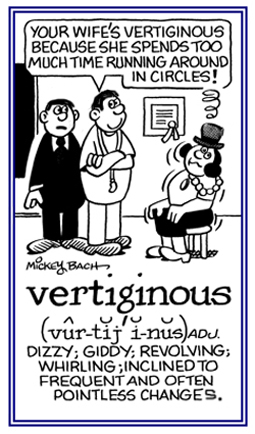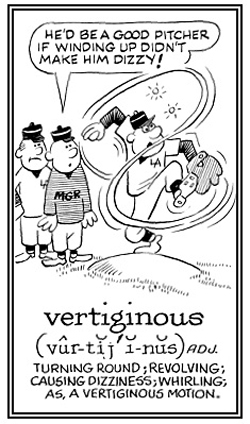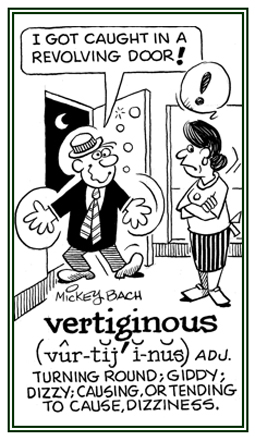vers-, vert-, -verse, -version, -version, -versation, -versal, -versary, -vert, vort-, vors-
(Latin: bend, turn)
vertebrally
vertebrate
vertebrectomy
vertex
vertical
verticality
vertically
verticil
verticillation
vertiginous (adjective), more vertiginous, most vertiginous
1. A reference to causing or likely to cause a feeling of dizziness and disorientation; especially because of great heights: Those who want to be pilots are tested for susceptibility to vertiginous reactions before they can train to be members of the flying profession.

© ALL rights are reserved.

© ALL rights are reserved.

© ALL rights are reserved.
Go to this Word A Day Revisited Index
As a first time passenger in an aircraft, Jacob was overcome with a sudden vertiginous sensation as the plane went up into the sky.
2. Etymology: from Latin vertiginosus, "dizzy"; from Latin vertigo, "turning, twisting" and related to vertere, "to turn".


Go to this Word A Day Revisited Index
so you can see more of Mickey Bach's cartoons.
1. A spinning of or a rotary activity: "Sometimes wind currents are vertiginousness in their movements."
2. A feeling of giddiness or a sense of dizziness: "People who have feeling of vertiginousness must be careful or they could pass out or stumble and injure themselves."
2. A feeling of giddiness or a sense of dizziness: "People who have feeling of vertiginousness must be careful or they could pass out or stumble and injure themselves."
"A high walkway over a canyon can cause serious vertiginousness for some people; especially, when it is wobbling, or moving back and forth, or shaking."
A sensation or feeling dizziness or whirling around including a loss of balance often as a result of looking down from a great height or by some disease affecting the inner ear: "Although he worked as a contractor on tall buildings, he had to be careful not to look down because there were times when he felt vertigo which could cause him to lose his balance."
vervel
vice versa
The other way round; the change being turned.
The order or relation being reversed; in reverse order; conversely.
vortex
1. A whirling mass of something; especially, water or air, that draws everything near it toward its center.
2. A place or situation regarded as drawing into its center all that surrounds it.
3. A situation, or feeling, that seems to swamp or engulf everything else.
4. Etymology: from 1652, "whirlpool, eddying mass"; from Latin vortex, variant of vertex, "an eddy of water, wind", or "flame; whirlpool; whirlwind", from the Latin stem of vertere, "to turn".
2. A place or situation regarded as drawing into its center all that surrounds it.
3. A situation, or feeling, that seems to swamp or engulf everything else.
4. Etymology: from 1652, "whirlpool, eddying mass"; from Latin vortex, variant of vertex, "an eddy of water, wind", or "flame; whirlpool; whirlwind", from the Latin stem of vertere, "to turn".


